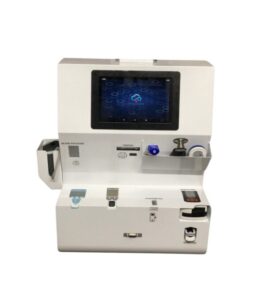How To Maintain Your Hospital
4 min readWithout effective hospital maintenance procedures, important equipment may fail, maintenance employees may be assigned inefficiently, and non-compliance may result in costly fines and a tarnished reputation.
Managers and efficiency are at the bottom of the to-do list for healthcare maintenance directors and their teams, who must play catch-up and respond to crises distributed throughout hospitals. Let’s go over all you need to know about hospital maintenance.
-
Create A Strategy For Communication
Poor communication is a problem that affects many industries, not just hospitals. Bad communication within the hospital system can lead to poor management, which could result in the system’s failure. Adopting effective communication tactics, such as specialized communication channels, can help your employees work together more effectively and strengthen the interaction between them and their patients.
-
Be Patient-Focused
Everything your hospital does should be centered on improving patients’ experiences, from employing new employees to implementing new rules to developing new hospital tools. Patients are your customers, and if you can’t meet their demands, they’ll suffer or seek healthcare elsewhere. Treat your patients well, use the greatest tools, and hire well-educated doctors. These are some of the characteristics of excellent hospital management.
-
Train The Staff Consistently
Every hospital has its own rules, regulations, and procedures for running day-to-day operations. As a result, regardless of a new employee’s existing experience or qualifications, training will nearly always be required. On-site or off-site training is available. Encourage your employees to regularly attend training workshops and seminars to improve their leadership abilities. Concentrate on non-clinical training that improves managerial, information-handling, technical, and, most significantly, leadership abilities.
-
Automated Inventory Management
Begin managing a hospital by documenting all assets in stock so that maintenance operations may be planned around them. Types of medical equipment should be labeled and entered into an online management system. Each device will have its unique ID, allowing for easy tracking.
Additionally, utilize barcode labels to capture pertinent information about each asset. Automated data entry reduces the chance of human error, allowing hospitals to keep correct records. It is also imperative to have safes in a hospital. You should choose the best safe manufacturer for this purpose to elevate security in the premises.

-
Separate Administrative Services
Silence is required in critical places such as the stores, front office, and administration. In a crowded location, it is impossible to retrieve a patient. The physical and mental well-being of patients is greatly influenced by a calm and clean environment. Manage a distinct path for patients and their relatives to enter this site, bypassing the main facility.
LED strips are in high-demand these days and serve such purposes well. Look for the best led strip supplier that will help the management navigate patients and suit your needs.
-
Manage Time Effectively
Patient satisfaction and health results can be improved by spending more time on patients and their treatments than administrative duties. However, if administrative duties and procedures are causing a bottleneck in the process, look for ways to cut down on the time it takes to perform them. Electronic health records, for example, can help with data retrieval and sharing. Automate communication, data entry, and other procedures if you want to be more efficient.
-
Reduce Your Downtime
Patient scheduling is an important part of a hospital’s operating system that significantly impacts patient care. It has an impact on patients, personnel, and healthcare providers alike. Accordingly, it is basic to expand the number of appointments a medical care supplier can acknowledge and decrease patient free time when patients neglect to appear for their appointments.
-
Create A Strategic Plan
Hospital management, like any other industry, must design a comprehensive strategic plan. This should include the organization’s goals, employee career routes, long-term goals, and other data that guides the institution.
-
Invest In Marketing
Company-public communication has never been more vital than it is now. As a result, marketing has grown in importance. This is because institutions may more readily win and retain patients using the information and techniques created by specialists. They also start to place themselves in the market more appropriately.

-
Crisis Prevention Culture
It’s critical that each employee feels personally responsible for crisis prevention. Some crises are caused by the behavior of employees and those in their immediate environment. Your employees will grow more responsible as they become more aware of the implications of their behavior. They’ll be more cautious and prepared to avoid a problem before it occurs.
River Baby is one of the best brands for childcare products. You can buy various items for the little ones at the best prices.
Conclusion
Many strategies to enhance a hospital exist, which appear overly simple. However, in the midst of the daily grind, even the most basic measures for improving workflow are often forgotten. However, by using these simple but effective strategies and then delving further into the organizational procedures, you can improve your hospital’s workflow and make it more efficient than before.
You’ll be shocked how much time and resources you and your healthcare professionals may save by simply streamlining the workflow through these methods.






